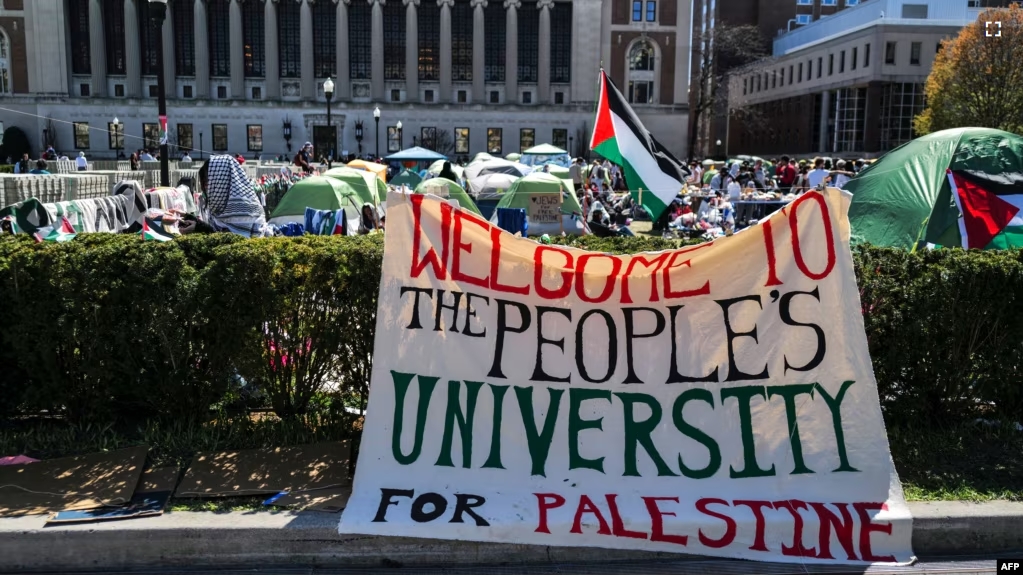Tensions over strong opinions about Israel’s war in Gaza are spreading at some universities around the United States.
On Monday, Columbia University in New York City canceled in-person classes. Pro-Palestinian demonstrations, including occupations, have been taking place on campus for days. Last week, police arrested more than 100 demonstrators at Columbia.
Also on Monday, police in New Haven, Connecticut, arrested about 45 protesters at Yale University. Officials said the students refused orders to leave an area they were occupying.
Columbia and Yale are two of the so-called “Ivy League” universities considered among the nation’s top schools.
Pro-Palestinian demonstrations also are taking place on other campuses around the country, including the University of Michigan, the Massachusetts Institute of Technology, and the University of North Carolina.
Columbia University President Minouche Shafik said in a statement Monday that she was “deeply saddened” by what was happening at the school.
I am announcing that all classes will be held virtually on Monday,” Shafik said, adding that she hoped the move would ease tensions.
Shafik said the Middle East conflict is terrible and that she understands that many are experiencing deep moral unease.
“But we cannot have one group dictate terms and attempt to disrupt important milestones like graduation…,” she said.
Over the coming days, a working group of Columbia professors and administrators will try to find a resolution to the university crisis, Shafik added.
Several students at Columbia and Barnard College said they were suspended for taking part in last week’s protests, including Barnard student Isra Hirsi, the daughter of U.S. Representative Ilhan Omar of the Democratic Party.
At Yale, police officers arrested about 45 protesters and charged them with misdemeanor trespassing, a New Haven police spokesperson said. All were being released on promises to appear in court later, the official said.
Protesters set up a camp on Friday and demonstrated over the weekend. They demanded that Yale end its investments in defense companies that do business with Israel.
On Sunday, Yale President Peter Salovey released a statement to the campus community. It said university officials had spoken to the student protesters several times about campus policies and guidelines.
“Putting up structures, defying the directives of university officials, staying in campus spaces past allowed times, and other acts that violate university policies and guidelines” create safety risks and interfere with the university’s work, the Yale leader said.
School officials said they spoke with protesters over several hours and gave them until the end of the weekend to leave the area. They said they again warned protesters Monday morning and told them that they could face arrest and punishment, including suspension from school, before police took action.
A large group of demonstrators gathered again after Monday’s arrests at Yale and blocked a street on campus, the police said. There were no reports of violence or injuries.
Last week, the University of Southern California took the unusual step of canceling a planned commencement speech by its 2024 valedictorian. The student had publicly supported Palestinians in the past. The university said it canceled the speech over security concerns. Supporters of free speech criticized USC’s decision. Some pro-Israel groups praised it.
I’m Caty Weaver.
The Associated Press reported this story. Caty Weaver adapted it for VOA Learning English.
________________________________________
Words in This Story
campus – n. the grounds of an organization related to education or research
virtually – adv. taking place through video or online, not involving a physical meeting or interaction
disrupt – v. to interfere with normal activities to prevent them from taking place
milestone – n. an important event that marks the end of one period in a person’s life and the beginning of another
graduation – n. a ceremony marking the completion of all classes required for a high school or university degree
misdemeanor –n. a minor offense under criminal law that is not punishable with a large fine or long prison sentence
trespassing –n. the crime of being in a place where you are not permitted by law to be
defy – v. to refuse to obey a law, its representative or a person representing authority
allow – v. to permit something to happen
commencement – n. the ceremony at which a degree is given at a school or college
valedictorian – n. a student, usually among the class leaders, who gives the ceremonial farewell speech to a graduating class
